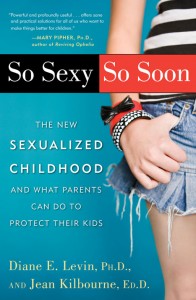
“So Sexy So Soon: The New Sexualized Childhood and How Parents Can Protect Their Kids” by Diane E Levin, Ph.D.
Little girls have dreamed of being princesses as long as there have been fairy tales. Thanks to Hans Christian Anderson, I myself had a slightly off-kilter fantasy of growing up to be a mermaid. But if I wanted to dress up as a mermaid for Halloween or to paddle around in my friend’s plastic pool I needed to create my own tail, so to speak. Like all former kids who are now today’s parents, my fantasies came directly from my own imagination… evolving naturally from my interests and taking me into realms I chose to explore through play.
But for 21st century kids, kids who live and breathe packaged princesses, Bratz dolls and Transformers, things are very different when it comes to what they play with, how they play and what they wear.
If you’ve got a daughter who can walk and talk you’ve likely had at least a few conversations and some strong disagreements about her choice of clothes. There’s nothing new about any of this. It’s the job of every generation to attempt to scandalize their parents. We did it to our parents and we didn’t turn out so bad.
But pop culture is way more extreme now and something very destructive is being foisted on our kids via TV shows, movies, print and media ads and on the racks in children’s clothing stores. For one thing, styles for girls of all ages are moving in a very dangerous direction. So much of what’s sold is too short, too tight, too low cut, too peek a boo, too… sexy for little girls. Yet there it all is. And they want these styles. Man, do they want them! Because their friends wear them and because too many little girls, tweens and teens truly believe that their value as people is a direct function of how they look.
It gets harder and harder for parents to carry out our prime objectives: keeping our kids safe and raising them to be compassionate, thoughtful, self-assured young adults. But the issue goes way beyond short shorts, crop tops and G-strings marketed for tweens. Beyond TV shows and toys that program girls and boys to think and act and play and dream in the narrowest, most gender-specific ways.
What’s going on here in 21st Century America is a war of values. On one side, parents doing their best to raise healthy young adults. And what are we up against? The marketing might of multi-billion dollar corporations. You probably don’t need anyone to tell you who’s winning.
In this week’s podcast I talk with Diane E. Levin, co-author of So Sexy So Soon: The New Sexualized Childhood And What Parents Can Do to Protect Their Kids.
Dr. Levin is Professor of Education at Wheelock College in Boston. She has written seven other books including: The War Play Dilemma, Teaching Young Children in Violent Times and Remote Control Childhood? Diane Levin speaks around the world on the impact of violence, media and other societal issues on children, families and schools.
Listen to my interview with Diane Levin right here:
[QUICKTIME http://www.anniefox.com/podcast/FC014.m4a 300 300 false true]
If you have iTunes, you can subscribe to this podcast in the iTunes Store.
Or, you can download an MP3 version here.
Upcoming guests include:
Amalia Starr, author of Raising Brandon: Creating a Path to Independence for your Adult “kid” with Autism & Special Needs
Matthew Amster-Burton, author of Hungry Monkey: A Food-Loving Father’s Quest to Raise an Adventurous Eater
David McQueen, international speaker empowering adults and youth alike on subjects such as leadership, careers and communication skills.
Hannah Friedman, author of Everything Sucks: Losing My Mind and Finding Myself in a High School Quest for Cool
Dara Chadwick, author of You’d Be So Pretty If…
*What’s a podcast? “A podcast is a series of digital media files, usually either digital audio or video, that is made available for download via web syndication.” –Wikipedia… So, in this case, there’s an audio file for you to listen to (in addition to reading the above).













